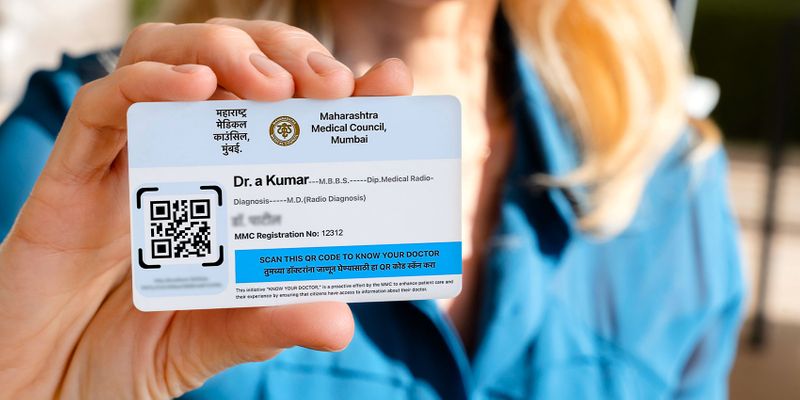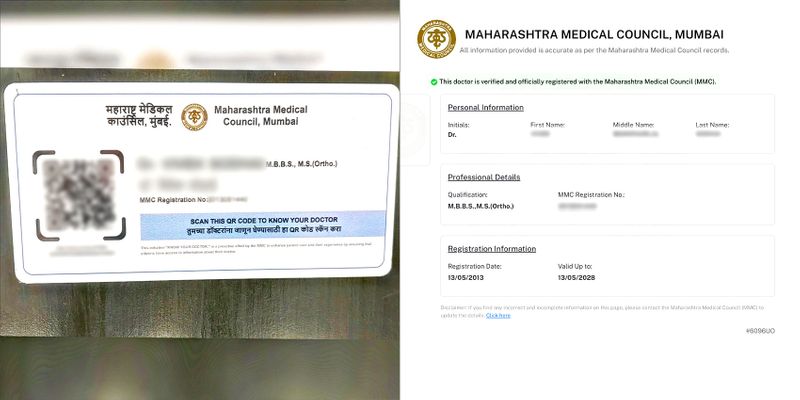MMC QR Code System to Tackle Fake Doctors in Maharashtra

This image design is used for inspirational and reference purposes only. Details and the actual QR code are edited for privacy reasons.
The Maharashtra Medical Council (MMC) makes the QR code-powered Know Your Doctor (KYD) system mandatory for all registered medical practitioners, in a decisive move to tackle medical malpractice.
Maharashtra, India—The council implements the QR code system to tackle fake doctors in Maharashtra, a long-term initiative to combat the rise of unlicensed practitioners across the state.
The initiative allows patients to verify a doctor’s credentials instantly on their smartphones by scanning a QR code.
The code created using a reliable and secure QR code generator and linked to the MMC’s official website brings transparency and accountability to the forefront of healthcare.
Table of Contents
Fake doctors: India’s silent epidemic
India’s healthcare system has been facing challenges stemming from medical fraud, patient exploitation, and widespread unprofessional practices.
A 2019 article published by The Hindu revealed that 57.3% of personnel currently practising allopathic medicine in India do not have a medical qualification.
Recently in a raid led by Vice-Chairman Dr. G. Srinivas, the Telangana State Medical Council uncovered 15 unqualified individuals posing as doctors in Sangareddy district.
Although, majority of the individuals established clinics as Registered Medical Practitioners (RMPs), they lacked the necessary training for patient treatment.
Most of their clinics were located in industrial and slum regions where migrant workers reside. Since the workers could not afford real doctors, they would visit fake doctors for treatment.
Furthermore, the team also found Bachelor of Ayurvedic Medicine and Surgery (BAMS) qualified doctors who were practicing allopathy.
Earlier in India, District Medical and Health Officer (DM&HO) Dr Gayathri seized clinics, nursing homes, and labs for violating rules of the Medical Council.
The police arrested a man in Madhya Pradesh who was accused of impersonating a UK-returned doctor. He was working as a cardiologist at a missionary hospital in Damoh.
In December 2024, the Gujarat Police arrested a gang operating in Surat that offered medical degrees, even to class 8 graduates, for ₹70,000 each. They also arrested the doctors who purchased degrees from them.
By adopting QR in medicine and healthcare practices, the MMC aligns with recent discussions in the state legislative assembly addressing the growing concern over bogus doctors, particularly in rural India.
Know Your Doctor QR codes: The cure for medical fraud

This image design is used for inspirational and reference purposes only. Details and the actual QR code are edited for privacy reasons.
Launched on February 11, 2025, the KYD platform links each medical QR code to an MMC-verified profile displaying the doctor’s registration status, updated licences, specialization, and areas of expertise.
Patients only need to scan the QR code displayed at clinics, hospitals, or consultation rooms to confirm if a medical practitioner is officially registered and qualified to treat them.
According to Dr. Vinki Rughwani, administrator in MMC, “With the rising threat of quackery, especially in villages, it has become essential for us to ensure that citizens can trust their doctors.”
This new mandate proposed by the council aims to close that gap. The move highlights the growing role of QR codes in healthcare as a tool for improving transparency, ensuring practitioner legitimacy, and safeguarding patient trust.
About 10,000 out of the two hundred thousand registered medical practitioners in Maharashtra had enrolled in the KYD system during its voluntary phase.
As India continues to battle the menace of medical fraud and unqualified practitioners, several organizations are stepping up to address the issue.
A Kolkata-based charity, for instance, is working to train unqualified individuals who have been posing as doctors, as a goal to improve primary healthcare delivery in underserved areas.
Safer healthcare with every scan
The MMC’s decision to mandate QR code verification marks a significant step toward greater transparency and accountability in the medical field.
The implementation of the KYD QR code system to tackle fake doctors in Maharashtra empowers the public by allowing them to confirm the doctor’s identity in a quick scan.
Dr Sunil Ingale, president, Indian Medical Association, Pune Chapter affirms, “Making the KYD QR code mandatory is a much-needed step. It not only protects patients from falling into the hands of quacks but also helps build trust in genuine doctors. It’s a win for ethical medical practice.”
QR codes are not mere convenience tools anymore. They bring in trust, transparency, and real-time access into the healthcare system.


